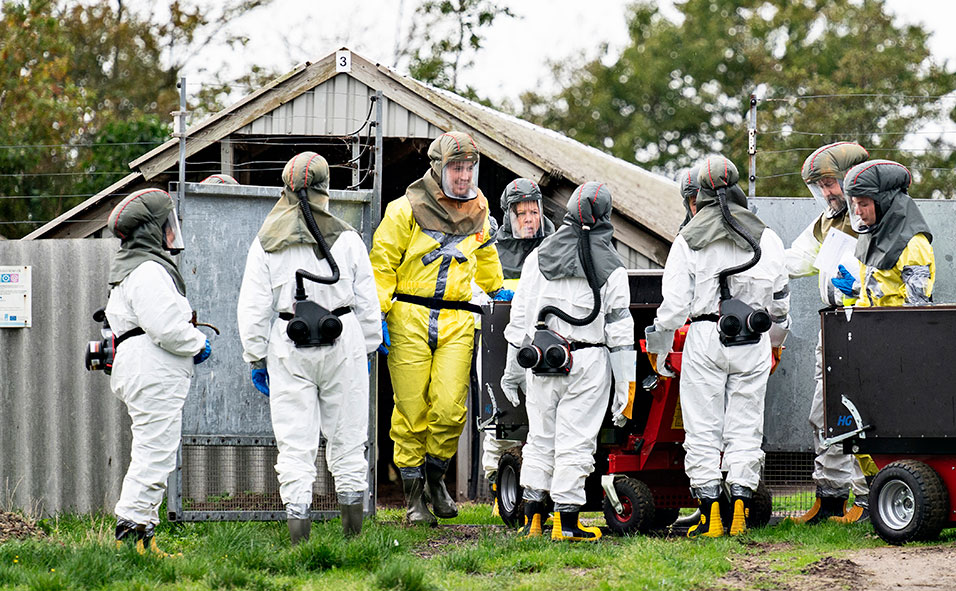CLEVELAND, OH.- University Hospitals and
Case Western Reserve University announced recently that UH Cleveland Medical Center has been selected as a clinical trial site for the Phase 3 global study of an investigational vaccine against SARS-CoV-2, sponsored by AstraZeneca (LSE/STO/NYSE: AZN). The trial is funded by the National Institute of Allergy and Infectious Diseases (NIAID), part of the National Institutes of Health, and the Biomedical Advanced Research and Development Authority (BARDA), part of the U.S. Department of Health and Human Services’ Office of the Assistant Secretary for Preparedness and Response. UH is part of the NIAID-supported COVID-19 Prevention Network (CoVPN). UH will study AZD1222 as one of approximately 80 clinical investigational sites in the U.S. that will collectively enroll up to 30,000 participants.
AZD1222 was co-invented by the University of Oxford and Vaccitech and licensed to AstraZeneca. It uses a replication-deficient chimpanzee viral vector based on a weakened version of a common cold virus (adenovirus) that causes infections in chimpanzees and contains the genetic material of the SARS-CoV-2 virus spike protein. After vaccination, the surface spike protein is produced, priming the immune system to attack the SARS-CoV-2 virus if it later infects the body.
“We are pleased to be bringing our community another potential tool in our fight against the coronavirus,” said Daniel I. Simon, chief clinical and scientific officer and president of UH Cleveland Medical Center and the Herman K. Hellerstein Professor of Medicine at the CWRU School of Medicine. “Since the beginning of the pandemic, UH physician-scientists and caregivers have worked tirelessly to secure a range of options for our patients related to the testing, treatment and prevention of COVID-19. In fact, UH currently has more than 130 interventional and observational clinical studies underway to gain understanding of the pathogenesis of COVID-19 as well as the impact and outcome of various therapeutic treatment options.”
The Phase 3 trial is designed as a 2:1 investigational vaccine candidate to placebo, randomized, double-blinded study to obtain safety, immune response, and efficacy data needed for regulatory review for this unique vaccine development approach. This method uses a defective virus to deliver the gene for the SARS-CoV-2 spike protein, which has been demonstrated in earlier human trials to generate neutralizing antibodies and cellular immune responses against the coronavirus. This vaccine platform is a non-replicating viral vector and is expected to induce durable immune response with two doses administered four weeks apart.
“UH Cleveland Medical Center is one of 12 sites in North America participating in the HIV Vaccine Trials Network (HVTN), the world’s largest publicly-funded, multi-disciplinary international collaboration facilitating the development of vaccines to prevent HIV/AIDS,” explained Grace McComsey, vice president of research and associate chief scientific officer at UH and a professor at the CWRU School of Medicine. “When the COVID-19 pandemic began, HVTN joined with other NIAID-funded clinical research networks to focus on clinical trials related to SARS-CoV-2, thus forming the CoVPN. Because of UH’s involvement in HVTN, many UH physician-scientists have extensive knowledge in vaccine research and hence were natural choices for investigating the efficacy of the potential COVID-19 vaccines. It is a great honor to be collaborating with the scientific community and helping to find solutions for combatting the coronavirus.”
The study, which aims to enroll non-pregnant adults older than 18, will be conducted at UH Cleveland Medical Center in collaboration with the CWRU School of Medicine. Jeffrey Jacobson, attending physician in the Division of Infectious Diseases and HIV Medicine at UH Cleveland Medical Center and professor of medicine at CWRU School of Medicine will serve as the principal investigator. Additionally, Barbara Gripshover, medical director of the Special Immunology Unit at UH Cleveland Medical Center and professor of medicine at CWRU School of Medicine along with Leila Hojat, attending physician in the Division of Infectious Diseases and HIV Medicine at UH Cleveland Medical Center and assistant professor of medicine at CWRU School of Medicine will serve as co-investigators.
The trial’s primary endpoint will be prevention of COVID-19 illness after two doses in those who have not been infected by SARS-CoV-2 prior to immunization.
“We are pleased to participate in an additional trial of a COVID-19 vaccine, enhancing options for potential coronavirus prevention,” said Jacobson. “Recently, the U.S. FDA had paused this trial in the U.S.; however, the FDA along with the Data and Safety Monitoring Board have carefully reviewed all the data from both the COVID-19 vaccine trial and all other trials using this type of vaccine and felt it was safe to continue the trial. There are numerous strict safety procedures in place during a trial to monitor the health of participants and show that the careful oversight process is working. And because of the disproportionate occurrence of COVID-19 among people of color, as well as a greater severity of disease and higher death rate, we will aim to have solid representation from this population group included in our study.”










